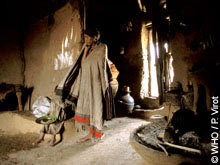 |
HOUSING AND LIVING CONDITIONS, in detail
|
 |
 |
 |
 |
 |
|
|
 |
Insufficient income confines millions of people to squalid housing, and turns others into homeless people. Bad housing may have many consequences: promiscuity, lesser protection against diseases, difficulty to sleep and rest, difficulty for children to do school homework, fire hazards, family conflicts, lesser social interaction, etc. Poverty may also entail inability to afford heating and cooling (sometimes with deadly consequences where temperatures are extreme), basic household appliances, telephone installation and transport costs.
|
|
|
Often, sanitation systems are insufficient, drinking water unavailable or remote, evacuation and rescue difficult in emergencies. In some poor neighbourhoods, waste is not removed, thus creating sources of epidemics and other health problems. Poor neighbourhoods also often lack schools, playing grounds, sports and entertainment facilities, and may sometimes be unsafe. Lack of access to transport and telephone makes it more difficult to find work or to exert an independent economic activity. Costs of transportation limits both access to work and to recreation. Poverty of the household makes it impossible sometimes to pay for electricity or to be connected to the power network, thus depriving low-income households of commodities as well as of the possibility to improve their living standards through productive activities that require electrical energy.
|
|
 Living in sub-standard housing may also lead to a loss of self-esteem and lead to isolation. Homelessness increases all these problems and nearly always entails exclusion from medical care. Homelessness usually also entails exclusion from a host of administrative services and, where applicable, social benefits. Often illiterate, the homeless have no guidance as to the necessary and possible administrative procedures for renewing official documents, receiving financial or medical support, and searching the job market. They do not learn about public and private initiatives for the homeless and the jobless. The physical health of people lacking shelter is particularly vulnerable and depends heavily on climate. Many homeless people, particularly in industrial countries, seek comfort in alcohol or drugs, which perpetuates their poverty. Living in sub-standard housing may also lead to a loss of self-esteem and lead to isolation. Homelessness increases all these problems and nearly always entails exclusion from medical care. Homelessness usually also entails exclusion from a host of administrative services and, where applicable, social benefits. Often illiterate, the homeless have no guidance as to the necessary and possible administrative procedures for renewing official documents, receiving financial or medical support, and searching the job market. They do not learn about public and private initiatives for the homeless and the jobless. The physical health of people lacking shelter is particularly vulnerable and depends heavily on climate. Many homeless people, particularly in industrial countries, seek comfort in alcohol or drugs, which perpetuates their poverty.
|
|
 Housing is a human right that must be guaranteed through public and private initiative. Local, regional and national authorities may provide low cost social housing, free or special rates for energy and water, safe water supply and sanitation, sports and recreational facilities and activities. Public and private initiatives can enable access of poor people to credit for housing and household appliances. Community initiative by people concerned can lead to cleaner environments, collective equipment. Support for administrative and legal matters can be provided through public or private initiative. Housing is a human right that must be guaranteed through public and private initiative. Local, regional and national authorities may provide low cost social housing, free or special rates for energy and water, safe water supply and sanitation, sports and recreational facilities and activities. Public and private initiatives can enable access of poor people to credit for housing and household appliances. Community initiative by people concerned can lead to cleaner environments, collective equipment. Support for administrative and legal matters can be provided through public or private initiative.
|
|
Free transport and telephone services, literacy programmes, vocational training and information about employment opportunities are also key, the goal being for people to be able to afford decent housing at equitable prices.
|
|
|
 |
|
